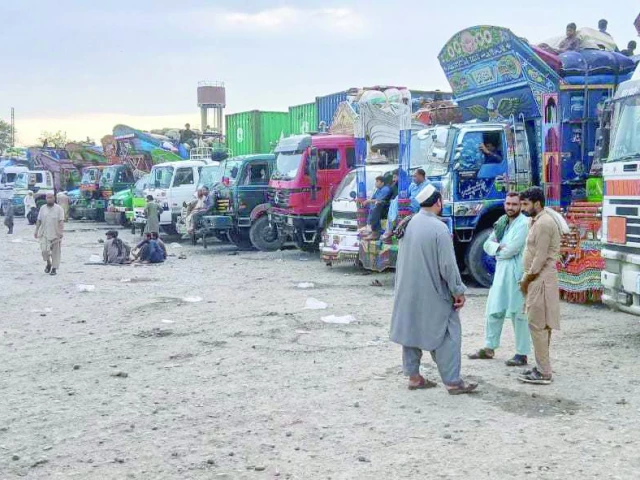Tensions freeze relations between Pakistan and Afghanistan; thousands of trucks blocked
Trucks loaded with refugee goods queue at the Torkham border before their return to Afghanistan. PHOTO: EXPRESS
PESHAWAR:
PESHAWAR
Ongoing tensions at the Pakistan-Afghan border have paralyzed all forms of bilateral trade and transit since Sunday, October 12, causing severe economic losses on both sides and leaving thousands of trucks stranded along major crossing points.
According to security sources, this suspension follows an exchange of fire late in the night of October 11-12, when Afghan forces allegedly opened unprovoked fire on Pakistani border troops. Pakistani forces responded forcefully, sparking heightened tensions along the border from Chitral to Balochistan. As a result, the four main trading gates, Torkham, Kharlachi, Ghulam Khan and Chaman, have been closed indefinitely.
The shutdown crippled cross-border trade and disrupted Afghan transit trade, dealing a blow worth billions of rupees to both economies.
New data from the Federal Board of Revenue (FBR) for the financial year 2024-25 highlights the scale of the disruption. Every year, Pakistan imports goods worth $66.328 million from Afghanistan through Torkham crossing and exports goods worth $62.766 million. Through Ghulam Khan route, average imports are $80.109 million and exports are $33.240 million annually. The Kharlachi gateway accounts for imports of $30.38 million and exports of $27.32 million, while trade through the Chaman gateway comprises imports of $80.289 million and exports of $265.06 million annually.
Collectively, Pakistan’s four major border points with Afghanistan process average annual imports worth $566.766 million and exports totaling $1.504 billion, thereby contributing significantly to the national exchequer. FBR data shows that bilateral trade generates around Rs 46.867 billion annually in customs duties alone.
Pakistan’s main exports to Afghanistan include rice, cement, pharmaceuticals, medical equipment, textiles and fresh fruits, while imports from Afghanistan mainly consist of coal, fresh and dried fruits, soapstone, vegetables and other raw materials. The suspension of Afghan transit trade through these same crossings has compounded the losses, with customs officials confirming that the government is losing millions of rupees in daily revenue.
Khyber Chamber of Commerce and Industry President Muhammad Yousaf Afridi in an interview highlighted that Afghanistan remains Pakistan’s closest and largest market. “The closure of these trade corridors has effectively frozen industrial activity across the country,” he said.




